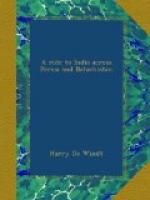But even his angelic temper is tried when, shortly afterwards, we ride past the gipsy encampment As he dismounts to light a cigarette out of the wind, one of the sirens in a tent catches sight of the little Russian, and in less than half a minute he is surrounded by a mob of dishevelled, half-naked females, who throw their arms about him, pull his hair and ears, and try, but in vain, to secure his horse and drag him into a tent. These gipsies are the terror of travellers in Persia, the men, most of them, gaining a precarious living as tinkers and leather-workers, with an occasional highway robbery to keep their hand in, the women living entirely by thieving and prostitution. The gentlemen of the tribe were, perhaps luckily for us, away from home on this occasion. One of the women, a good-looking, black-eyed girl, was the most persistent among this band of maenads, and, bolder than the rest, utterly refused to let Gerome get on his pony, till, white with passion, the Russian raised his whip. This was a signal for a general howl of rage. “Strike me if you dare!” said the girl, her eyes ablaze. “If you do you will never reach the next station.” But in the confusion Gerome had vaulted into his saddle, and, setting spurs to our horses, we galloped or scrambled off as quick as the deep snow would allow us. “Crapule va!” shouted the little man, whose cheek and hair still bore traces of the struggle. “Il n’y a qu’en Perse qu’on fait des chameaus comme cela!”
Ispahan is about seventy farsakhs distant from Teheran. The journey has, under favourable conditions, been ridden in under two days, but this is very unusual, and has seldom been done except for a wager by Europeans. In our case speed was, of course, out of the question, with the road in the state it was. The ordinary pace is, on an average, six to eight miles an hour, unless the horses are very bad. It was nearly a week, however, before we rode through the gates of Ispahan, and even this was accounted a fair performance considering the difficulties we had to contend with.
Towards sunset the wind rose—a sharp north-easter that made face and ears feel as if they were being flogged with stinging-nettles. It was not until dusk that we reached Rabat Kerim, a small mud village, with a filthy windowless post-house. But a pigstye would have been welcome after such a ride, and the vermin which a flickering oil-lamp revealed in hundreds, on walls and flooring, did not prevent our sleeping soundly till morning. My thermometer marked only one degree above zero when we retired to rest, and the wood was too damp to light a fire. But we are in Persia!




